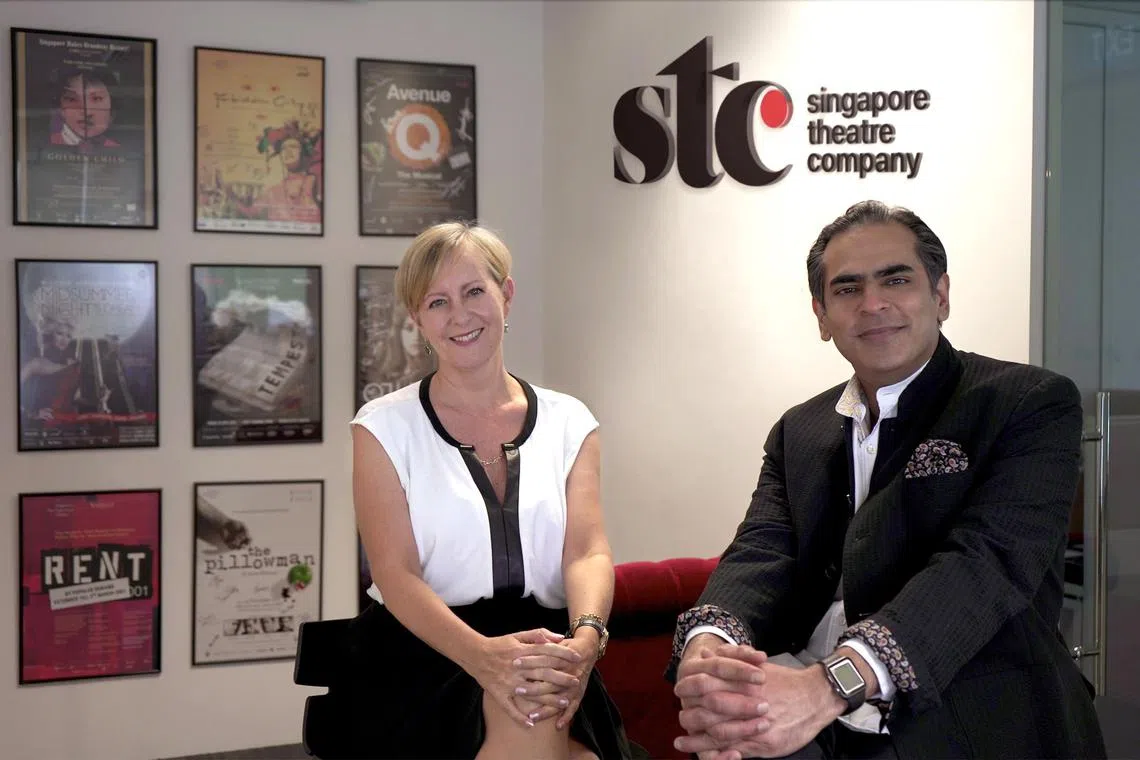‘No company can be Singapore Theatre Company’: SRT’s rebrand draws flak from theatre community
Sign up now: Get ST's newsletters delivered to your inbox

STC's managing director Charlotte Nors and artistic director Gaurav Kripalani found themselves blindsided as theatre practitioners began voicing their discontent.
PHOTO: SINGAPORE THEATRE COMPANY
Follow topic:
SINGAPORE – A decision by the Singapore Repertory Theatre (SRT) to rebrand as Singapore Theatre Company (STC)
The former SRT is best known for its productions of Shakespeare in the Park at Fort Canning Green, and had said the new name would help it fly Singapore’s flag better overseas, the word “repertory” being also an old-fashioned term.
But having teased the name change for days, STC artistic director Gaurav Kripalani and managing director Charlotte Nors found themselves blindsided as theatre practitioners began publicly voicing their discontent at what they saw as an appropriation of the label of “Singapore Theatre”.
“To wear the name of ‘Singapore’, one has to incorporate the diverse elements of this beautiful nation,” Rama Chandran, founder and director of children’s theatre company Act 3 Theatrics, said on Facebook, shortly after the new name’s unveiling on Jan 31.
“One must be soaking with the blood, sweat and tears of her citizens. I must want to stand up and sing ‘Majulah Singapura’ when I am applauding your effort.”
He later reiterated to The Straits Times (ST) that no company should have the right to call itself the “Singapore Theatre Company”, with so many having worked tirelessly since the early days of independence to nurture Singapore’s arts industry.
“All professional, semi-professional and amateur theatre companies and groups form and represent Singapore theatre. No single company can and should own the Singapore name.”
Rama’s was the first salvo fired at STC, which marked its 30th anniversary in 2023 and has made its name staging blockbusters from Broadway and the West End.
Multilingual theatre company The Theatre Practice’s artistic director Kuo Jian Hong said she was “caught by surprise” when she first came across the news, and hopes STC will reconsider its decision.
Her gripe, she said, is not with whether the company is “worthy” or “befitting” of the new name.
“Rather, it is that no one theatre company can truly say it is ‘Singapore Theatre Company’. We are too diverse, too multi-faceted, too colourful for one company to make that claim, which requires a lot of undertaking and widespread support or acknowledgement.
“I think, collectively, we are the Singapore theatre company.”
The Singapore theatre scene comprises many companies which have each established its own niche.
STC occupies a mainstream but far from representative slice of the pie and specialises in importing and adapting English-language plays.
This is in addition to companies such as Wild Rice and Checkpoint Theatre that are known for staging home-grown English scripts, as well as mother tongue theatre companies such as the primarily Malay-speaking Teater Ekamatra, Mandarin theatre group Nine Years Theatre and the neophyte, Tamil-focused Agam Theatre Lab.
There is also a diversity of practices here. Drama Box, for instance, practises quite a bit of community theatre, creating works in collaboration with underserved communities, while The Finger Players fuses puppet theatre with other disciplines such as dance.
Playwright-director A Yagnya said she is concerned STC’s new name will lead to the eclipsing of these other “Singaporean theatres”.
She pointed out that though many Singapore artists have benefited from SRT’s support, the company has up till now lacked Singaporean plays addressing local issues, hired a large number of foreign directors, and made the choice to predominantly cast actors without Singaporean accents and languages.
“If this is a locally based company that is so outward-looking, why brand it with Singapore? What does that say of Singapore as a nation?” she asked.
The name STC situates the company alongside those like the Singapore Symphony Orchestra, Singapore Chinese Orchestra and Singapore Ballet, all national flagship companies in the eyes of the general public.
She said: “Would this make them the authority on Singaporean theatre, even if it hasn’t been done intentionally? What makes our theatre, Singaporean? Who is recognised by those in power? These questions shall brew and grow.”
On Feb 1, STC’s Mr Kripalani told ST that it is sticking to its new name, although it was never the company’s intention to position itself as the catch-all Singaporean theatre company.
He said the rebrand stemmed from a wish to remove “repertory theatre” – used to describe a company with a group of full-time actors who perform works from a repertoire – from SRT’s name, while still retaining Singapore in its name to reflect its roots.
STC was settled upon after consulting some of its peers. The company regrets any unhappiness caused and will be mindful moving forward.
Mr Kripalani added: “We recognise that we are part of a wonderfully broad and diverse ecosystem, and do not claim to be the representative theatre company of Singapore. All of us have a role to play in the Singapore theatre community. We have tremendous respect for our peers (and) value the perspectives shared from the wider community.”
Any arts company with the word Singapore in its name requires approval from the authorities, and the National Arts Council on Feb 1 confirmed that it had supported STC’s application with the Accounting and Corporate Regulatory Authority.
The council said it was aware that there are different views to the name change and noted that the vibrancy of Singapore’s arts landscape is the result of contributions from many companies and individuals.
On STC’s future role, it added: “We recognise their intent to refresh and reposition itself for the longer term, and the vision and direction remain at the discretion of the company’s board and management.”
Some in the theatre community were willing to play down the significance of the name change and give STC the benefit of the doubt.
In a short e-mail, Nine Years Theatre co-founder Nelson Chia noted that STC has had the word Singapore in its name for the past 30 years.
“The change in name is a removal of ‘repertory’ which in fact it is not.”
Artistic director of The Second Breakfast Company Adeeb Fazah said STC may now have to bear a greater responsibility to the community.
“Does it have new initiatives to champion Singaporean works? Is it platforming more Singaporean artists? How is it planning to represent Singapore on the international stage? For me, it remains to be seen.”


